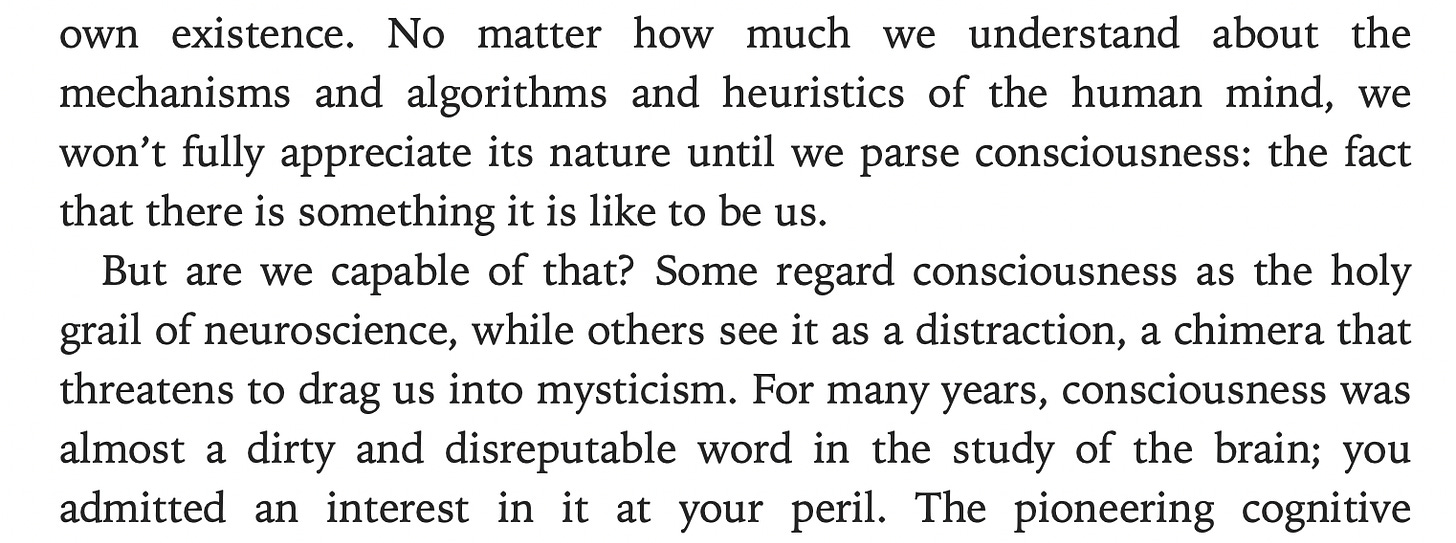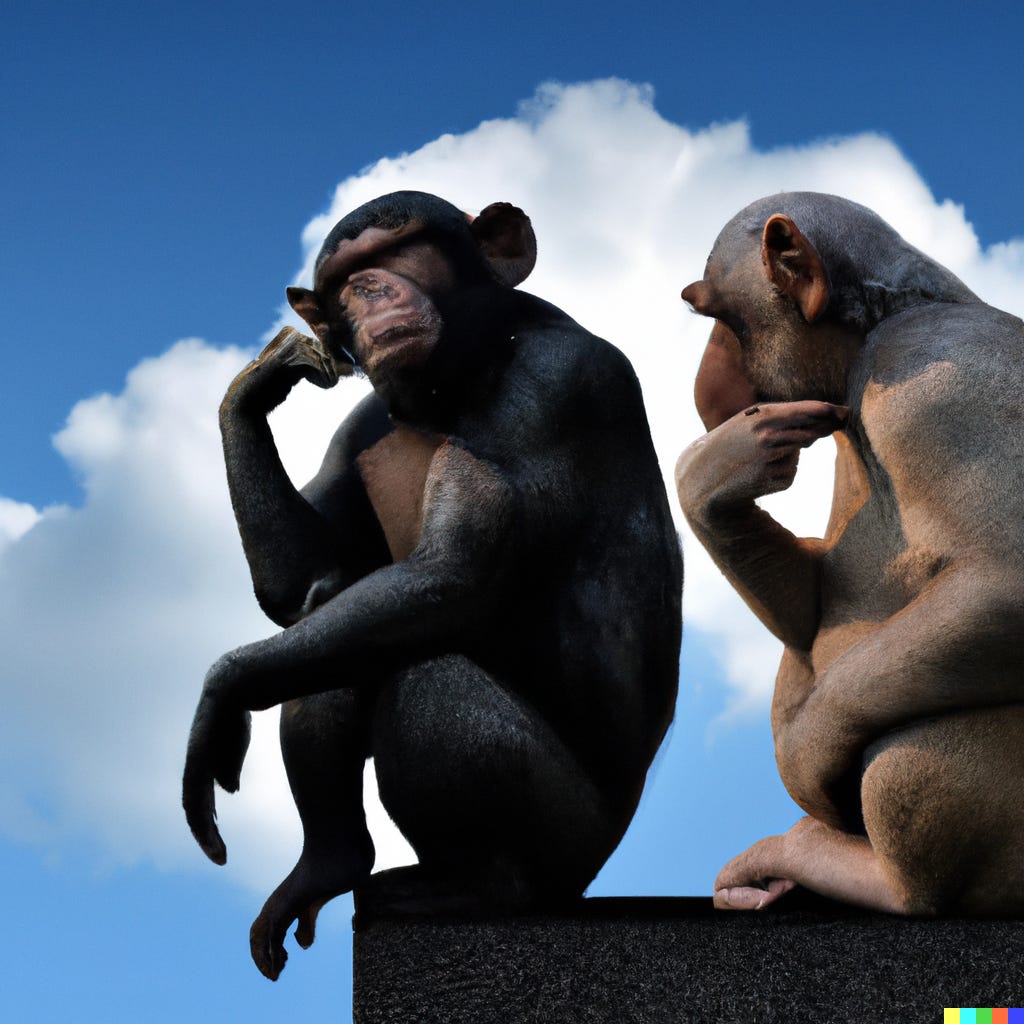The Book of Minds 7: Consciousness and Solidarity
One can’t discuss the mind without dipping one’s toes in the sea of consciousness. Marketing 101 says: thou shalt not write a book about the mind without mentioning consciousness. Ball is no exception to this rule.
Some quick thoughts on consciousness
The Bubble
From Descartes onward, there’s a strong intuition that all of us live in a bubble, and being the sole insider to that bubble, we have privileged access to its contents, while everyone else can only infer its contents through indirect means. It sure feels like it when you are a parent of a teenager.
Even if the bubble theory has some validity, it's pretty clear that the bubble state has a history - developmental as well as cultural. Developmentally, it coincides with the transition away from childhood. No child ever thinks she's transparent to the parent, but the default is that the parent has privileged access and perhaps even superior access to the child’s consciousness on certain occasions. When I read about consciousness as "what it's like to see red," I don't see a universal phenomenon but a culturally situated one. Not as blatantly cultural as a child transitioning into a teenager but cultural nevertheless.
Experiencing objects as objects.
Both in science and in popular culture, we talk about the difference between the world as it is and the world as experienced, with only the latter being available to our minds. But here’s the problem: we don’t experience the world as an experience - we experience the world as it is. When I look at a red rose, I don't get the feel of "I am looking at a red rose" or "red rose as it appears to me." There’s no ‘I’ in the experience itself. Instead, what I experience is redness in a flower-shaped form to which I attach the label red rose and that upon reflection may be classified as being in a state of experiencing redness. The first item on the list - the bare experience, so to speak - just happens to me. It's done and accounted for before I get to the stage of reflecting upon it.
Pre-reflectively, that experience doesn't belong to me - I don't experience the rose as my experience but as the rose and the rose alone. It's only in the post-reflective experience that the "me" is assigned to the form that's being experienced. No need to toss that self out, but its good to put that self in its place.
And if the experienced rose is illusory, merely a projection of our minds, then why should we place any trust on science being able to access the world as it is: the great trust in there being a world out there, that the universe isn’t a hallucination, is itself grounded in experience. There’s no science without that trust.
Experience beyond consciousness
The typical investigation of consciousness assumes an isolated object - for example, we might ask what that red rose in front of you looks like when you pay attention to it with foveal vision1. Experience contains much more than foveal consciousness. Much of it is about the mood or feel of the world. While taking a walk down the street, I am comforted by its familiarity while also noticing that the colors of the trees are changing in the early fall. I also notice that it's a cloudy day and that the lack of sun makes the leaves on the trees look different than if it was the blazing summer sun.
That familiar "sameness" of ones habitual environment isn't there in the immediate view - in fact, the red rose I smelled yesterday is a little bit different from the one I am smelling today; it's been two full days since I bought the flowers from the store and its petals are have dried out and its hue isn't as rich. Yet, it's the same flower. That experience of sameness is as central to my conduct as the actual feeling of what it's like to smell or see the object in front of me.
The Grammar of the World
Sameness and unity, among other attributes, are part of the grammar of the world without which the world can't make sense at all. This object is a rose and that object is a table but both are temporary unities that persist as the same object. Unlike that puff of smoke. Where does that unity come from:
1. Is it inferred from the unity of the object itself, i.e., the rose or the table has an intrinsic unity that's inferred by our senses.
2. Is it supplied by the mind? Does our brain impose that unity on the stimulation it receives from the outside?
3. Is the unity in the world - part of the furniture of being human?
These are some of the questions we want to answer about experience, questions that point to facets of experience beyond the foveal concerns of consciousness and whose answers will take us beyond the purely descriptive approaches of phenomenology.
Knowing as Being
In much of science, we are happy predicting and explaining. I might predict that there’s another planet beyond Uranus based on observations of Uranus’ trajectory around the Sun. I might explain the possibility of gravitational attraction at a distance by postulating the ether as the medium through which gravity is transmitted and then I might explain away the ether using Einstein’s Special Theory of Relativity.
But explaining consciousness (using whatever theory) can never explain it away, for what’s truly of value is being conscious, not predicting it or explaining it. That there’s something like what it is to be a bat is far less interesting than being a bat. We will grasp the consciousness of other creatures only by entering their being, however approximately, and that can be done only by extending our being: in other words, only first person approaches to consciousness will meet the intuitive criterion of ‘is this the right way of knowing consciousness?’ There’s a name for how we extend our being to encompass others: solidarity.
Summing up: Solidarity
Over the last week, I have used Philip Ball’s book to talk about how an exploration of the space of possible minds is central to planetary thought. What’s most important is to step away from thinking about monkeys and octopuses to thinking with monkeys and octopuses. Planetary thought is more like a dance than interrogating a reluctant suspect.
Thinking with has a political counterpart: acting with, and together, they form two wings of solidarity with other beings. Will we be able to think with monkeys? We absolutely need to. Will we be able to think with bacteria? What about rocks? Long ways away, but why not? Whoever we choose to think with, our first person science of minds can’t be divorced from concern for those minds. Which brings me to Tagore and Gandhi and exploring how their ideas influence our views on planetary solidarity.
General principle: planetary politics and planetary science have to go hand in hand.
This being the end of the summer in the US with Labor Day coming up on Monday, I am going to take a few days off and return with a reading of Tagore-Gandhi sometime towards the end of next week.
Also, it's always vision that takes the honors in the annals of consciousness. We rarely ask what it's like to smell the rose, or to ask how the smell of a fresh roti pulls you into the kitchen and ask about what else is for dinner.








